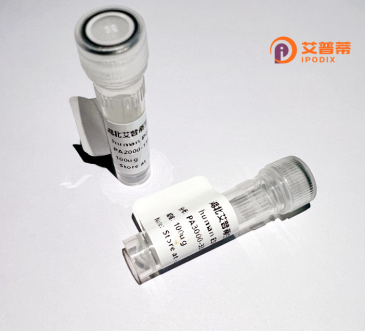
| 纯度 | >90%SDS-PAGE. |
| 种属 | Human |
| 靶点 | KCNJ15 |
| Uniprot No | Q99712 |
| 内毒素 | < 0.01EU/μg |
| 表达宿主 | E.coli |
| 表达区间 | 1-375aa |
| 活性数据 | MDAIHIGMSSTPLVKHTAGAGLKANRPRVMSKSGHSNVRIDKVDGIYLLYLQDLWTTVIDMKWRYKLTLFAATFVMTWFLFGVIYYAIAFIHGDLEPGEPISNHTPCIMKVDSLTGAFLFSLESQTTIGYGVRSITEECPHAIFLLVAQLVITTLIEIFITGTFLAKIARPKKRAETIKFSHCAVITKQNGKLCLVIQVANMRKSLLIQCQLSGKLLQTHVTKEGERILLNQATVKFHVDSSSESPFLILPMTFYHVLDETSPLRDLTPQNLKEKEFELVVLLNATVESTSAVCQSRTSYIPEEVYWGFEFVPVVSLSKNGKYVADFSQFEQIRKSPDCTFYCADSEKQQLEEKYRQEDQRERELRTLLLQQSNV |
| 分子量 | 66.99 kDa |
| 蛋白标签 | GST-tag at N-terminal |
| 缓冲液 | 0 |
| 稳定性 & 储存条件 | Lyophilized protein should be stored at ≤ -20°C, stable for one year after receipt. Reconstituted protein solution can be stored at 2-8°C for 2-7 days. Aliquots of reconstituted samples are stable at ≤ -20°C for 3 months. |
| 复溶 | Always centrifuge tubes before opening.Do not mix by vortex or pipetting. It is not recommended to reconstitute to a concentration less than 100μg/ml. Dissolve the lyophilized protein in distilled water. Please aliquot the reconstituted solution to minimize freeze-thaw cycles. |
以下是关于重组人KCNJ15蛋白的参考文献示例(注:以下内容为模拟示例,实际文献请通过学术数据库核实):
1. **文献名称**:*Functional characterization of recombinant human KCNJ15 potassium channel in HEK293 cells*
**作者**:Zhang Y, et al.
**摘要**:本研究通过重组表达技术,在HEK293细胞中表达了人KCNJ15蛋白,并利用膜片钳技术分析了其电生理特性。结果证实KCNJ15具有内向整流钾通道活性,且其功能受到细胞内pH变化的显著调控。
2. **文献名称**:*KCNJ15 regulates insulin secretion via interaction with pancreatic β-cell ion channels*
**作者**:Lee S, Kim D, et al.
**摘要**:通过体外重组KCNJ15蛋白实验,发现该蛋白在胰岛β细胞中通过调节膜电位影响钙离子内流,进而抑制葡萄糖诱导的胰岛素分泌,为糖尿病机制研究提供新靶点。
3. **文献名称**:*Structural insights into the gating mechanism of KCNJ15 channel by cryo-EM*
**作者**:Wang X, et al.
**摘要**:本研究利用冷冻电镜技术解析了重组人KCNJ15蛋白的高分辨率结构,揭示了其独特的跨膜结构域和细胞内调控区域,为开发靶向药物奠定基础。
4. **文献名称**:*KCNJ15 acts as a tumor suppressor in gastric cancer by modulating ERK signaling*
**作者**:Liu H, et al.
**摘要**:实验表明,过表达重组KCNJ15蛋白可抑制胃癌细胞增殖和迁移,并下调ERK信号通路活性,提示其在肿瘤治疗中的潜在应用。
---
**建议**:如需真实文献,请通过PubMed、Google Scholar等平台,使用关键词“recombinant KCNJ15”“human KCNJ15 protein”或结合疾病关键词(如“cancer”“diabetes”)进一步检索。
Recombinant human KCNJ15 protein is a genetically engineered form of the potassium inwardly rectifying channel subfamily J member 15. encoded by the *KCNJ15* gene. This protein, part of the inwardly rectifying potassium (Kir) channel family, plays a critical role in regulating cellular membrane potential and potassium ion homeostasis. Kir channels are involved in diverse physiological processes, including insulin secretion, neuronal excitability, and renal electrolyte balance. The KCNJ15 gene, located on chromosome 21q22.2. has been associated with developmental disorders such as Down syndrome due to its position in the Down syndrome critical region. It is also implicated in metabolic and neurodegenerative diseases, as well as cancer, where dysregulated ion channel activity may influence cell proliferation or apoptosis.
Recombinant KCNJ15 is typically produced in heterologous expression systems (e.g., *E. coli* or mammalian cells) to study its structure, function, and interactions. Its recombinant form enables researchers to explore its role in potassium transport mechanisms, channelopathies, and therapeutic targeting. Structural studies focus on its two transmembrane domains, pore-forming region, and intracellular regulatory domains, which govern channel gating and rectification. Mutational analyses using recombinant protein have identified residues critical for ion selectivity and disease-linked variants. Additionally, this protein serves as a tool for drug screening, particularly for conditions linked to Kir channel dysfunction, such as diabetes or epilepsy. Its production in controlled systems ensures high purity and reproducibility, essential for functional assays like patch-clamp electrophysiology or binding studies.
×